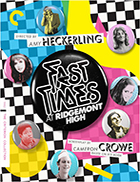Fast Times at Ridgemont High
|  In the late 1970s, a 22-year old journalist named Cameron Crowe, who had been writing for major music publications like Rolling Stone and Creem since he was 16, did a very interesting thing. Curious about what life was like in a contemporary American high school (he had graduated high school early at age 15 in 1972), he decided to go undercover and pretend to be a teenager again, essentially living the senior year in high school he had never had. He spent an entire year infiltrating Clairemont High School in San Diego, making friends with a large and varied group of kids and writing down everything he could. When the year was up, he identified himself and his purpose to his newfound friends, and many of them allowed him to conduct further interviews to flesh out the details. The result was a slim, but insightful and entertaining book called Fast Times at Ridgemont High. So, of course the book was optioned for a film before it even hit stores, and a year later, first-time director Amy Heckerling, a recent graduate of the American Film Institute, had the movie in theaters—although, it should be noted, the studio was so convinced that it would be a bomb that they slashed the number of the theaters in which it was set to open, fundamentally erasing it from the East Coast. Fast Times, of course, turned out to be a major hit, especially once it landed on home video and cable television, where it played in endless rotation and became a cult item for teenagers because it was a movie told about them from their point of view and without condescending to their experience. The truthfulness of Crowe’s journalistic book—which is poignant, painful, and also deeply funny—is fundamentally woven into the film’s fabric, giving it a sense of frank authenticity that many so-called “teen exploitation” movies of its era studiously lacked (and never really cared to have anyway). However, as good as much of the film is, there is something fundamentally unwieldy and imbalanced about Fast Times at Ridgemont High. While few things have been changed in the transition from paper to screen (Crowe penned the screenplay himself), the movie doesn’t quite rise to what it could have been because it doesn’t emphasize the fact that these are real people and real events. Its frank depiction of awkward, fumbling adolescent sexuality and embarrassment was already a staple of the teen genre, so if you didn’t know it was based on real people and events, you might assume it to be simply opportunistic (film critic Roger Ebert sure did in his now notorious one-star take-down). Much of the film feels too much like “a movie,” and its raw sociological insights and notes of grace risk being drowned out by the Top 40 soundtrack and all the ready-made, repeatable riffs of dialogue (not surprisingly, Fast Times is a great movie to quote). There is much to admire in the film—for one, its amazing cast of then largely unknown actors, virtually all of whom went on to major Hollywood careers and several of whom have won Oscars (Sean Penn, Forrest Whitaker) or been nominated (Jennifer Jason Leigh). Although his role is really nothing more than a glamorized cameo, Penn was immediately launched into the realm of the bona-fide movie star with his uproarious turn as the imminently likable surfer Jeff Spicoli, who is infamous for having been stoned since the third grade. With his red-rimmed eyes and blissed-out Southern California drawl, Penn has a huge presence in the film, and every whacked line, non-sequitur, and random observation he utters resonates with the sheer hilarity of his utter conviction of character. He is who he is. But, the heart of the film lies in a love triangle—or actually, it’s more of a square ... sort of. (You know how these high school things are.) Stacy Hamilton (Jennifer Jason Leigh) is a naive freshman who wants desperately to be sexually experienced simply because everyone else is. At the behest of her older, more outgoing friend, Linda Barrett (Phoebe Cates), she throws her virginity away on an older stereo salesman in a particularly uncomfortable scene that takes place in a baseball dugout. The whole time Stacy stares up at the ceiling, and you can tell that she isn’t enjoying what she is doing, nor is she proud of it. Heckerling refuses to soften the scene or give it a gloss of Hollywood sheen or exploitative amusement; it is awkward and even a bit sad. Meanwhile, Brian Ratner, a.k.a. The Rat (Brian Backer), a shy and clumsy honor roll student with a terribly nice disposition, has his eye on Stacy. He is the kind of guy who is too decent for his own good, not to mention seriously lacking in self-confidence. His more outgoing, accomplished friend is Mike Damone (Robert Romanus), one of those guys who talks much more than he should about things he doesn’t know much about (interestingly, he and Linda are essentially flip sides of the same character, as the film suggests that Linda is not nearly as experienced or knowledgeable as she makes herself out to be, a curious ambiguity that becomes more and more obvious with each viewing). Mike exudes confidence and a slightly smug superiority, but it is mostly just an act. However, to a guy like Ratner, Mike “knows his stuff,” therefore he is someone to take seriously. The upshot of the whole situation is that Stacy and Ratner are meant to be together, but things get unnecessarily confused because they listen to their not-as-informed-as-they-present-themselves-as friends too much. There are several other characters interspersed throughout the film, including Stacy’s older brother, Brad (Judge Reinhold), who takes particular pride in his job at the local burger joint, and Charles Jefferson (Forest Whitaker), probably the only black student at Ridgemont who also happens to be the most sought-after football recruit in all of California. And then there’s Mr. Hand, the despotic high school teacher everybody had and everybody loves to hate. Brought to life with wonderful, clenched-jaw resilience by Ray Walston, Mr. Hand comes alive because he honestly doesn’t understand why none of the kids are interested in his history class. “What, are you all on dope?” he asks, thinking the question is rhetorical. Mr. Hand is determined to make decent citizens out of his class of slackers, and that is what makes him so delightfully intolerable. All the elements of a sincere exploration of the mess of adolescence are here, but the film is simply too unwieldy. It never manages a consistent tone, and it wavers between harsh realism and bawdy vulgarity. Individual scenes work marvelously, but it doesn’t quite come together like it should (or like we want it to). Fast Times deals with a whole gamut of controversial subjects, including masturbation, drug use, adolescent sex, and even abortion, yet it goes about them with completely different approaches. The masturbation and drug use are used as embarrassing gags, while the sex scenes and the attendant abortion subplot are intentionally stifling and uncomfortable in their realism. It is not that either of these approaches is inherently bad; rather, they don’t coexist well in the same movie. It takes a real understanding of tone and a nimble ability to shift gears, and Fast Times all too often clunks from one tone to the next. Still, Fast Times at Ridgemont High remains a staple of the raunchy Hollywood teen genre, even as it seeks and often succeeds in transcending it. It is very much a product of the early Reagan years, with its soundtrack loaded with MTV-ready hits by the likes of The Go-Go’s, The Cars, Billy Squire, and Oingo Boingo; a keen sense of the centrality of shopping malls to adolescent suburban culture (something absent from Crowe’s book that Heckerling added); and a self-conscious recognition of outlandish ’80s fashion (there is a whole conversation about three different girls trying to emulate the Pat Benatar look and an early shot that appears to be just a crass tracking of female derrieres is actually a sly comment on the ubiquity of Jordache jeans). However, unlike most films of its type, Fast Times transcends some of its shortcomings because it sees its characters as real people because they were real people, something that most viewers were unaware of at the time of its release. The teenagers in the audience sensed it, though, even if they didn’t know it explicitly. They discerned, on some level, that they were watching themselves and their friends on the big screen—their experience, sometimes painfully honest, sometimes comically exaggerated—writ large.
Copyright © 2021 James Kendrick Thoughts? E-mail James Kendrick All images copyright © The Criterion Collection | |||||||||||||||||||||||||||||
Overall Rating: 

 (2.5)
(2.5)


